Listen:
Scroll down for a transcript, how to subscribe, and more
Welcome to Episode #21 of Habitual Excellence, presented by Value Capture.
Joining us today is Cliff Orme, FACHE, he is president of International Hospital Group, headquartered in Dallas. With nearly 30 years of international hospital leadership experience, Cliff has a track record for developing high-performing management teams and achieving world-class financial, clinical and operational results. He possesses a deep understanding of operations management and business development for freestanding and for multi-site facilities.
Cliff excels in directing hospital turnarounds and continuous improvement efforts. One of his primary objectives is to provide quality healthcare and he successfully engages physicians and employees at all levels of the organization to improve safety, reduce medical errors and eliminate waste.
In this episode, Mark Graban asks Cliff about how the late Paul O'Neill influenced his leadership approach and style.
“I knew Paul for nearly 20 years and I can honestly say that no other leader has made a bigger influence or impact on the way I run my day-to-day than Paul. Paul and the Value Capture team completely changed the way I operated as an administrator.”
Cliff Orme
Quotes:
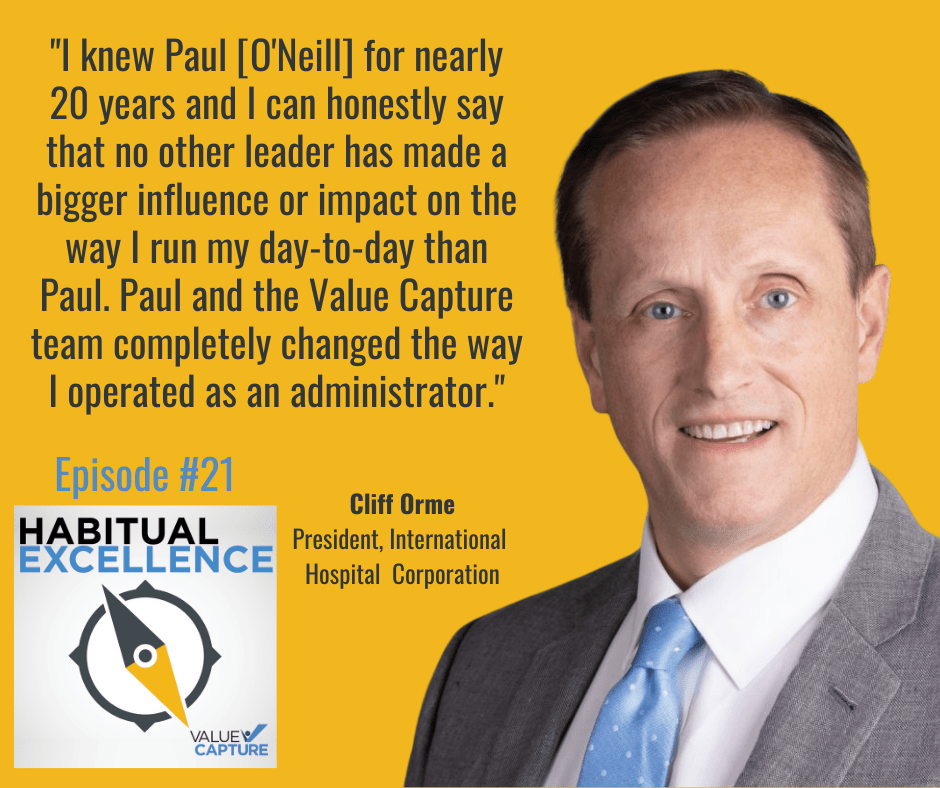
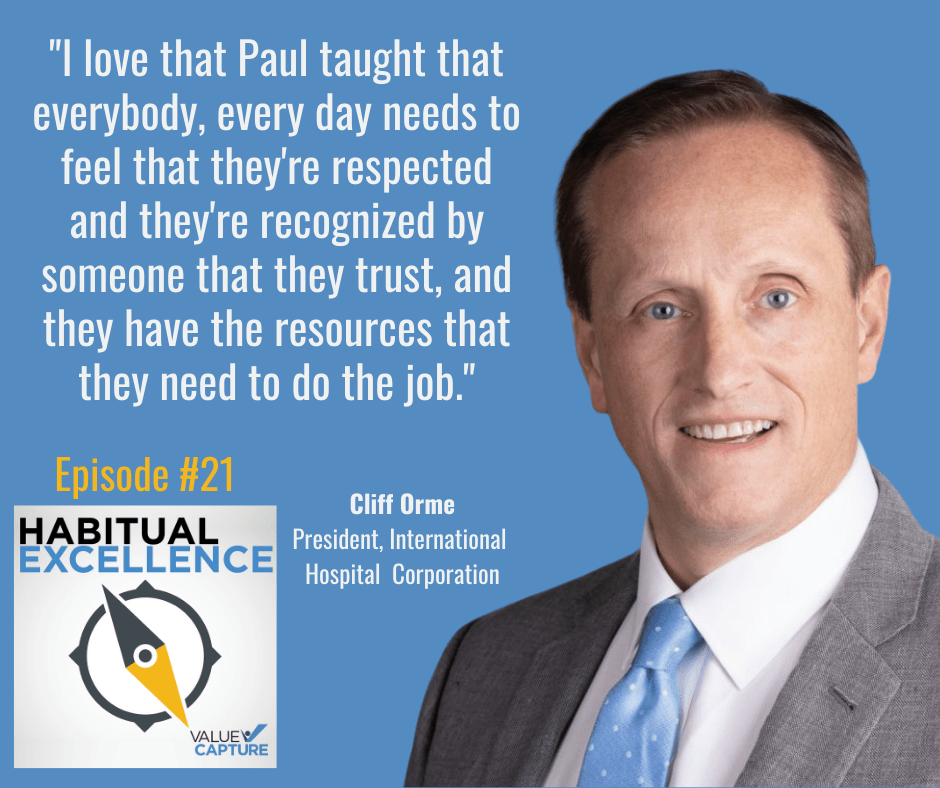
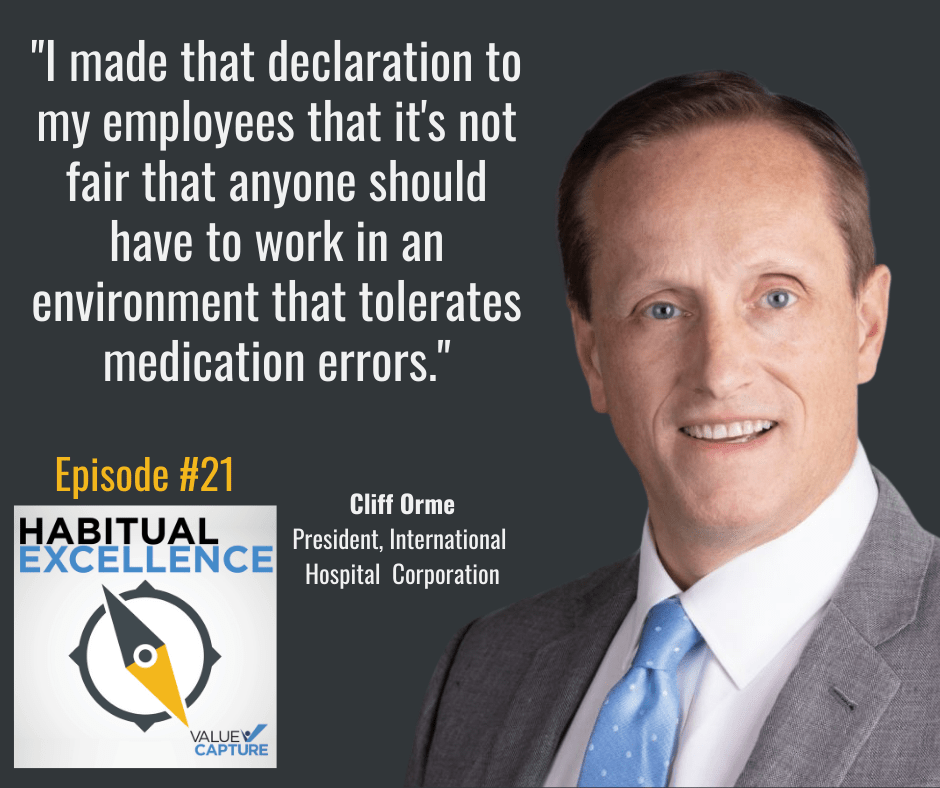
Click to visit the main Habitual Excellence podcast page.
Subscribe:
To make sure you don't miss an episode, be sure to subscribe today! Please rate and review the podcast.
Transcript:
Intro (2s):
Welcome to Habitual Excellence presented by Value Capture. This podcast and our firm is all about helping you and your organization achieve habitual excellence via one unifying focus, one value based structure and one performance system. In other words, it's about helping you capture dramatically more value through achieving perfect care and perfect safety for patients and staff. To learn more about value capture and our services visit www.valuecapturellc.com.
Mark Graban (36s):
Hi, welcome to Habitual Excellence on Mark Graban. And today we are joined by Cliff Orme. Cliff is the President of International Hospital Corporation based in Dallas, Texas.
Cliff Orme (48s):
How are you? I'm doing fantastic. How are you?
Mark Graban (51s):
I'm doing well. I'm really excited to hear what you have to share with us today. So we'll, we'll jump right in and hear your stories and reflections. How did Paul O'Neill's influence affect you as a healthcare executive?
Cliff Orme (1m 6s):
Well, I've known, I knew Paul for nearly 20 years and I can honestly say that no other leader has made a bigger influence or impact has had more influence on the way I run my day to day than Paul. Paul and the Value Capture team completely changed the way I operated as an administrator. I've spent half of my time outside the U S now, but at the, at the time I met Paul, I, I had just been in hospital administration as a CEO for about 10 years.
Cliff Orme (1m 46s):
And I thought, I knew how to, how to run a hospital. And he told me otherwise. He showed me ways that we could improve that I never learned in business school nor in it, my residency in, in or fellowship in healthcare administration. It was a truly remarkable, eyeopening. So I always had an interest in quality. That was a from day one. When I, when I started in hospital administration, I, I knew that that I enjoyed that side of the business, but as a hospital administrator, your day to day is focused in, on, on the money side of the business.
Cliff Orme (2m 35s):
And, and I understand that that the money is important, that you need the fuel to keep the business going. But what I really enjoyed, what got me going, was seeing the look in people's eyes. When, when we worked on mission type issues. We, we actually had an, a couple of the organizations. I ran a very inspiring mission statements. One was to enhance the way we care for people's health. The other one was provide care, encompassing, mind, body, and soul. And, and these were, were a words that, that got people going.
Cliff Orme (3m 17s):
And, and I see that if you can get people passionate about what they're doing, I becomes a virtuous cycle. They, they do a good job for the patient. The patient rewards, the business and the business has the money to invest in. And shareholders are happy. Employees are happy, doctors are happy. And the cycle continues. When I met Paul, I was running a hospital in a, in a suburb of Pennsylvania, Pittsburgh, Pennsylvania, and that he didn't live too far from, from the hospital, so it was easy to him for him to get to, to our facility and, and help me out personally. And, but my first experience with Paul was at a meeting downtown, and I didn't even know who he was.
Cliff Orme (4m 3s):
I was invited to a meeting with all the CEOs of the hospitals and the health systems. And I decided, well, I gotta go figure out what everybody's interested in. And this Mr. Paul O'Neill must be somebody important. And so I said, at the end of the table, he was at the very front, I think there were 1520 of us around a board table in a boardroom. And he told us of his experience at Alcoa and as experienced at the US Treasury and talked about targeting Zero and spoke very energetically passionately, and actually asked us, give us a call to action.
Cliff Orme (4m 56s):
He said, how many of you are going to go back to your facilities and institute what I've been talking about about targeting zero? And there were a lot of blank stares. A lot of people staring at the table at anywhere, but, but at Paul and I was surprised at this reaction here was a man of his stature. And my colleagues weren't touched at all by, by what he was saying or appeared not right. And I'll be honest. I went back to the facility bewildered. I didn't know what a, what to think of the experience, but his words resonated with me.
Cliff Orme (5m 38s):
It wasn't until a few months later that I got a, a brochure in the mail from a group called Pittsburgh Regional Healthcare Initiative, PRHI and PRHI was working with the local hospitals on, on initiatives, always was a part of that group. At the time, it was sponsored by a Jewish Healthcare Foundation. And I saw a graphic at the, on the back page of that leaflet, where there was a horse race, and all the hospitals were represented by, by a horse leading the gate.
Cliff Orme (6m 20s):
And some of the horses were down the track and, and my hospital's horse was still at the gate. And I went to my quality manager and I said, explain to me why, why our horses still at the gate? And she said, she said to me, well, that's the PRHI. You have to actually ask them into their, into your facility and they'll help you. I said, well, how much does it cost? And they, and she said, it's free. Well, come. You know, we can use all the help. I didn't associate at the time, Paul with PRHI. It wasn't until later that I connected the dots. And the first thing that the PRHI consultants, which later became the Value Capture consultants taught me to do was to make a declaration.
Cliff Orme (7m 12s):
And I learned that Paul had, had made a declaration that Alcoa that it's not right for anybody to come to work and get hurt. I'm paraphrasing. And I thought, well, I'm not sure I'm ready to go to worker safety, but I will talk about something that affects workers, because I know in talking to my pharmacist and my nurses, that it it's very painful to them personally, when they commit a med error that actually reaches the hospital, the patient and, and affects or does harm. And so I said, I made that declaration to my employees that it's not fair that anyone should have to work in an environment that tolerates medication errors.
Cliff Orme (7m 59s):
And so I was going to create that support to allow for perfect patient care in the medication administration process. And I was impressed with how the employees responded to my declaration. I've never done anything like that. And it was new to me and I didn't know how they were going to respond, but they rose to the occasion. And, and the next next action I had to take was to create or give the order, cause I wasn't doing it, they're doing the work, but to being responsible for as the architect of a safety report for everything gone wrong at the facility.
Cliff Orme (8m 47s):
So we created this report. It was similar to what I'd seen in the past and, you know, from the quality management department. But the difference was, is rather than seeing a summary of all the things gone wrong a month later, I was seeing it in real time. I was seeing people report and I was rewarding people for reporting that. And, and I was putting resources into helping the employees solve the problems to root cause in real time. And all that was just super exciting for me and, and for the staff, the staff more motivated than ever.
Mark Graban (9m 30s):
Mmm
Cliff Orme (9m 32s):
I'll tell you that a few months in, we actually had a reporting system on paper that was captured in, in Excel. And it was a form in triplicate and the yellow copy went to the quality management department of the, of the, of the incident report. And I, and a quality manager the asked me down to her office and, and she said, cliff, what do you see in here? And I said, it's very yellow. Cause there was yellow pieces of paper everywhere, on every surface. And she said, I can't keep up.
Cliff Orme (10m 14s):
There's so much going on here that you're asking me to, to solve this stuff. I can't. And I said, well, first of all, we've got to create that help chain and, and you shouldn't be the person to solve it. But the idea that I, I, I took from that was, and in Pittsburgh, there are many, many bridges, in fact, probably more bridges per square mile than, than anywhere I've ever, I've ever lived. And I thought of the analogy of a bridge as, as something is, is happening, an incident that that's on its way to affect patient care or, or employee safety or anything gone wrong.
Cliff Orme (10m 58s):
It's like a log going under the bridge. If it's way downstream, we can't catch it, if it's too far too far gone. But if, if that, if that is approaching or, or under the bridge right there where we can analyze it, where we can actually pull it ashore and, and take it apart and, and stop it from, from, from hurting a patient, that's the time to get at at a problem. And so I kind of likened it to the staff, the whole, the whole process to CSI, you know, you've got a crime scene and you're trying to analyze what went wrong, but you need to, to, to do it while the gun's still smoking, you can't wait until six months later or a month later, or even a week later and really find out what went wrong.
Cliff Orme (11m 53s):
You have to it in real time. And that was the learning for me. I was very motivated when I saw the staff, just, just take off with these ideas and, and one of the first things in order to, to, to live that declaration, I, I, I got help from Paul personally. The declaration of, of, of creating an environment where no one has to, to experience the, the emotional impact of having participated in a medication error. And it, it came out of the relationship between the pharmacy and the floor.
Cliff Orme (12m 40s):
There was a indirect relationship that wasn't working and between the physician as well, and originating with the physician with unclear or illegible orders. Right. And so I, Paul said, you know, how can I help? And I said, well, why don't you come in and talk to the doctors? Or maybe he offered at that time? I don't, I don't recall. But we arranged to have him come to talk to the medical staff. And, and we got a record attendance at that general medical staff meeting, but I don't think the doctors were ready to hear what he told me. He said, what you're doing by writing, bacteremia is actually showing a lack of respect for your patients, for other members of the healthcare team, for nurses, for the unit secretary that that is trying to read that medication error it's or medication order.
Cliff Orme (13m 44s):
It is not in keeping with your level of professionalism and certainly not respectful. And, and there was a kind of heaviness set over the room, but it was the right message. And the doctors took it to heart. In fact, a few enlightened physicians became part of the task force that resulted in creating a, an ad hoc online order entry system, which we didn't have back at that time, a automated medical record and it was a, this was new for, for 2003, 2004 timeframe.
Cliff Orme (14m 31s):
So we were able to using that system that was doctor created, reduce medication errors by nearly 80% within 90 days. And it was, it was amazing because I'd walked onto the unit when we announced this and talk to a unit secretary, and she said, it's never going to happen Cliff, You're never going to see these doctors change. I've been doing this too long. They're not going to change. And lo and behold, within, within 90 days, we had a completely different behavior on the part of physicians. I saw it happen on, on another unit where we had one nursing leader that said I'm gonna eliminate a MRSA completely.
Cliff Orme (15m 22s):
And she, and, and, and other of her leaders and, and, and nurses and the quality management department, the whole health chain, devised a system using all the tools available to us from Value Capture, the 5S, kanban. We had a system where in every patient was swapped a nasal swab and to be treated as assumed to have MRSA until proven otherwise. And then they ended up the gowns came off and, and the full precaution prevention was, was, was stopped.
Cliff Orme (16m 8s):
But, and until that time, you know, we were spreading MRI say from patient to patient because we weren't identifying them early enough. And we reduced those combo MRSA to nearly zero.
Mark Graban (16m 22s):
It's interesting to think how people go from saying this isn't possible, to very quickly getting results, thanks to some key actions and words and direction from some key leaders, meaning Mr. O'Neill and yourself. I mean, that's why, how did people react then once they saw those results, did that, did that create believers?
Cliff Orme (16m 46s):
It's that virtuous cycle. It, it built on itself. And, and I can tell you that I've never seen up until that point. I had never seen people so excited about their jobs. They, they came in just motivated to, to, to Target Zero and talk about, about the level of, of engagement on the part of the staff and, and our financial results were improving, our satisfaction results, it was affecting every, every level of the business.
Mark Graban (17m 27s):
Okay. Can you talk about how you built upon that, that excitement?
Cliff Orme (17m 32s):
I had one of the regional representatives, the regional VPs come in from our corporate office, and I was trying to get the corporation excited about this and, and spread it to other, other hospitals within, within the chain. And the, there, the regional VP came into the pharmacy and he saw a storyboard and he saw a process flow. He saw a very motivated pharmacy staff, you know, when they, when they were able to, to perfect that, that medication administration process or, or, or work towards perfection, to drive out errors.
Cliff Orme (18m 16s):
And he said, you know, I don't know what she said. He walked out of the pharmacies. I really don't understand what you said, but I want to bottle that passion and take it to other places. But what he didn't understand is that it takes leadership at the top. It takes somebody inspiring and, and, and empowering those people at, at the, at the, at the level of, of the work, where the work is happening to make, to, to, to produce these kinds of results.
Mark Graban (18m 49s):
So I was wondering if you could reflect a little bit, I mean, going back to the first time you heard Mr. O'Neill speak, and you said that it resonated with you, but it seemed, you know, others were not connecting with him or, you know, some physicians were not ready to hear this. I know it's easier for you to say and figure out what you were thinking and your reactions, but, you know, do you have a sense of why others reacted this way? Do you, do, do you think they felt threatened or they thought his experiences were somehow not transferable? I mean, I realize I might be asking you to guess a little bit, but I'm, I'm guessing they're educated guesses.
Mark Graban (19m 32s):
If you have thoughts that?
Cliff Orme (19m 34s):
There's a certain level of arrogance that, that accompanied hospital administration, or that does that, it's different, it's different in hospitals and making aluminum may not be, if you say transferable to, to healthcare. Paul made a very clear case that, that the environment for worker safety is, is significantly more dangerous when you've got a molten aluminum overhead, and you're, you're moving 900 pounds pieces of, of, of metal, you know, down conveyor belts.
Cliff Orme (20m 23s):
And, and it's an amazing test case. And, and what I really liked was that I got the opportunity at that time to me, to Steven Spear from, from Harvard, Steven Spear was working on a, an article that was published in September, 2005 in the Harvard Business Review. And it was called a, it ended up being called Fixing Healthcare from the Inside, Today. He addressed some of those issues of, of how people were feeling about and, and, and feeling threatened by trying to, to apply these concepts to healthcare.
Cliff Orme (21m 12s):
There were, there were working in industry. And one of I'll tell you the example. I had a group of nurses working on a central line associated bacteremia project. And Steven was interested in this because he, he reported in the article that a quarter million central line associated bacteremias occurred per year in the U S and his statistic was that 15% of them resulted in death. And I got thinking with my infection control nurse, what percentage of our, of our patients die.
Cliff Orme (21m 57s):
And it, and the 50% number was, was in the ballpark, but I really wanted to know, six months out, how many passed away. Now, of course, the patient population we were serving at that time was the chronically critically ill patients. And so they had a lot of co-morbidities and, and the infection may not have resulted in death, but they may not been then, then the cause of death on, on the, on the report. But I had her call up all of our patients that had had a central line associated bacteremia in the last that had been discharged within the last six months or six months ago for a period of time, and we found out that there was a 40% mortality rate.
Cliff Orme (22m 52s):
And, and we looked at the cost per case, and it was between 25,000 and $80,000. And that was the additional cost related to, well, it was on top of, of the, the, the DRG. And so it was inefficient care. It was, it was very, very troubling to know that nearly half of those patients have had, had passed away, within six months. That was published in the article Steven's article, and within the month after it had been published, I got a call from the corporate office saying, why did you share that information with Harvard business review?
Cliff Orme (23m 40s):
What were you thinking? Or, and, you know, you didn't have the right to divulge this statistic. It makes us look bad. And I said, how does it make us look bad when we're, when we're fixing it? When we're showing that because of what we were doing, we're reducing central line associated to near zero. And, and that was the where it was that that was where we were, we were at that time, but now look at us today, but he said the article, doesn't say that, how do you now look like we're unsafe? So in answer to your question about, about the reaction of the, the leaders in that room, and my initial meeting with Paul, I think was the idea that we don't share information.
Cliff Orme (24m 31s):
It makes us look bad, it's destroyed public trust. Whereas my thought was, I'm going to have more trust if I know that the hospital is, is utilizing these tools and being open to, to the, to the problem. And unfortunately at the same time, Pennsylvania instituted this, this mandatory disclosure of, of, of all medical errors. And so we had to report these things and it started change, but at that time, nearly 20 years ago, there was no motivation impetus on the part of, of, of the healthcare executive to, to fix the problem.
Mark Graban (25m 19s):
You've touched on this, but I was wondering if you could elaborate a little bit on the importance of real time problem solving, you know, going from monthly reports to investigating things right away.
Cliff Orme (25m 33s):
That's what makes all the difference. It's, it's not to look at batching. And this, this has been accurate that I learned from, from a PHRI and Value Capture is we were batching problems versus looking at them one by one. And that was a concept that was new to me. And, and it was looking at every error as a potential for, for patient harm and or employee. And, and I need to come back to that, the, how my thinking because of Paul went from, from focusing in, on patient safety, to starting with worker safety.
Cliff Orme (26m 18s):
And that was a learning that I took away, but we were, we were seeing hundreds of errors and, and the reporting we were awarded people actually wrote hand written notes to the employees, thanking them, you know, recognizing them and newsletters, all those who participated and, and just changing the thinking that this is, this is something to be congratulated, rewarded for participating in solving these problems, and rather than just passing them on to, to the next shift.
Mark Graban (26m 58s):
So one of the things I want to kind of follow up on, you know, it was that moment of, of, of your deciding, you know, to stand up in front of the physicians to, to push this. You said that wasn't typically done in healthcare. I was wondering if you, you know, as you reflect a little bit of, you know, while, so, you know, why, why do that then? I mean, it's for an important reason, and you've got rate great results, but, you know, to, to, to take that leap was, you know, an important step. So I was wondering if you could tell me a little bit more of the thought process of deciding to go ahead and do that.
Cliff Orme (27m 34s):
Natural tension between hospital administration and physicians. So you're giving out resources and you do have to stand up often to, in, in situations that are uncomfortable. So that was not new to me, but it never occurred to me to make the idea of, of an illegible order, an issue of respect. I love that Paul taught that everybody, every day needs to be, feel that they're respected and they're recognized by someone that they trust, and they have the resources that they need to do the job.
Cliff Orme (28m 21s):
And he was, he, it was like a broken record for Paul in the end. And the idea of worker safety and looking at it from the worker's perspective was what he brought to me, which I I'd never framed it with the physicians in that, in those terms. You know, we'd look at the impact on the patient, but not the impact on other workers in the, in the chain, in, in, in, in that line of communication, that, that goes in the medication administration process. And he reframed the, the, the problem in a way that the physicians could understand, at least the enlightened physicians could understand and changed the way I looked at problems in, in, in, in boiling them down to the systems and, and communication paths and, and flowing information.
Cliff Orme (29m 23s):
So he depersonalized it. It's not about finding blame. And, and that was a mindset change that we weren't, nobody comes to work and says, I'm going to hurt somebody today, or I want to hurt somebody today, but they are put in positions, where the systems are flawed and they're not able to deliver perfect care. And that's my job to, to create that, that, that mechanism given the resources. And, and when I instituted this daily safety report, my neurologist came up to me and he said it was in the cafeteria.
Cliff Orme (30m 6s):
And I remember he said, I get it. Your, your daily safety report is like the central nervous system for the hospital and, and the pain sensors from the feet and from, from the extremities or from the internal organs, what, wherever is feeding information for the brain to be able to, to solve the problem and avoid pain. And, and I'd never heard it expressed that way, but that was the way he understood the daily safety report.
Mark Graban (30m 38s):
So this is for you for over 15 years. And, you know, I'm, I'm curious what you think of the past forward for yourself, for other leaders in healthcare, you know, these, these lessons and how they're applicable today.
Cliff Orme (30m 60s):
Well, I, at the time I left Pittsburgh, our company was sold and, and, and I actually took Paul with me to, before the company was sold or after the company was sold with the new ownership. And because the old owners supported me in this, they may not have, have embraced all those ideas and said, let's do them across the system, but they at least allowed me to do on a pilot basis, what I was doing in Pittsburgh. So once the, once the new orders came in, I took Paul with me to the corporate headquarters and met with the new CEO.
Cliff Orme (31m 44s):
And this guy gave him lip service, but Paul walked out of there and he says he doesn't get it. And he doesn't want to get it. I don't think this is the right place for you. And I don't think that we're going to be able to get very far. And he was right unless, you have a leader at the top who can embrace safety and worker safety and all levels of the organization that affects patient, patient safety. You're going nowhere.
Cliff Orme (32m 24s):
And so I left that organization. And when I was interviewing with, with the individual, who's my current chairman of the board, of the company, he and I discussed safety and quality. And I, and I told him, I said, unless you're, unless you are committed to safety and quality, I'm not your guy. I'm not, I'm not the person to run this organization. I'm not, I'm not a fit to, to, to be your president. And he said, cliff, I want to believe that the quality can, can lead to, to the types of results, financial, and otherwise that we're looking forward and, and it is in line with the keeping, with what we believe in of, of quality sustainability and ethics, which are the values of the corporation that I've, I've spent the last nearly 15 years working for.
Cliff Orme (33m 30s):
So I was able to translate what I learned from Value Capture and actually brought in Value Capture on, on, on a couple of engagements with, with my current company. And, and it, it just has worked across cultures. It's worked from country to country and I'm able to, to show some amazing results in terms of quality that I would not have otherwise. I mean, we literally have world class care and we've been able to do it for well over a decade and, and, and put our numbers up against any company in the world.
Cliff Orme (34m 15s):
And, and, and that's that I attribute to Paul and, and his people. And I mentioned to you that, that this time with the, with the experience and confidence I had in how the people responded to, to these concepts, I came in with a different declaration. And I, it was very similar to Paul's that it's not right for people to get hurt, and it's, it's not fair, and we're not going to tolerate it. If people don't come to work expecting that they're going to get hurt.
Cliff Orme (34m 56s):
And I broadened that definition, Paul helped me understand that there are three kinds of safety. There's physical safety. You know, we're not going to have nurses that get a needle sticks or, or, or have back strains or people that slip and fall at work, any number of ways that people can get to injured. There's also professional safety. I'm going to do everything I can to grow my staff, to help them develop, and that they understand that their careers are safe with me and this organization.
Cliff Orme (35m 38s):
And then the other kind of safety I learned from Paul is emotional safety. That it's not keeping with our values for our people to be belittled or to experience bullying at work. And when I talk to people about my definition of safety, that it's not fair for people to be hurt at work hurt professionally, hurt physically, hurt emotionally. It resonates, and it has created an amazing culture.
Mark Graban (36m 11s):
Well, thank you for taking on that, that challenge and, and accomplishing so much, you know, hearing you talk about, you know, before meeting Mr. O'Neill and after, you know. I think we all hope that leaders like yourself and others who've shared what they've learned and been inspired by, and what they've accomplished will help inspire others to do the same things. Because this is, I think a lot of this improvement is eminently achievable, but we, you know, we get stuck in old traps and old excuses. And if we think something's not possible, then that's sort of the end of the story. So, you know, I really appreciate it when leaders like yourself set up, raise up our high and set that tone for the organization.
Mark Graban (36m 59s):
So Cliff, thank you for that. And thank you for your sharing. Co you have a, a final thought maybe to leave the listeners with here today?
Cliff Orme (37m 8s):
Mark I, I think that this, this approach is essential for reforming healthcare, enlightened leaders like Paul and the people that he surrounded himself with and, and a group of, of wonderful administrators I've met along the way. There there's a community out there that's committed to these principles, and this is what makes our jobs fun. This is what makes, what could be a very difficult to and challenging environment exciting.
Cliff Orme (37m 56s):
And it's because you're seeing people develop and embrace these, these ideas, and there's nothing more satisfying than, than developing your people and protecting your people. That's that's, that's what I've learned. And Paul's been my most influential mentor.
Mark Graban (38m 16s):
Well, thank you, Cliff. And again, today, our guest has been Cliff Orme. He's the President of Hnternational hospital Corporation based in Dallas, Texas certainly wish the best to you and everybody in your organization.
Cliff Orme (38m 31s):
Thank you. It's been fun.
Mark Graban (38m 34s):
Thanks for listening to Habitual Excellence presented by Value Capture. We hope you subscribe to the podcast and please also rate and review it in your favorite podcast, directory or app to learn more about Value Capture and how we can help your organization on this journey to habitual excellence, visit our website www.valuecapturellc.com.
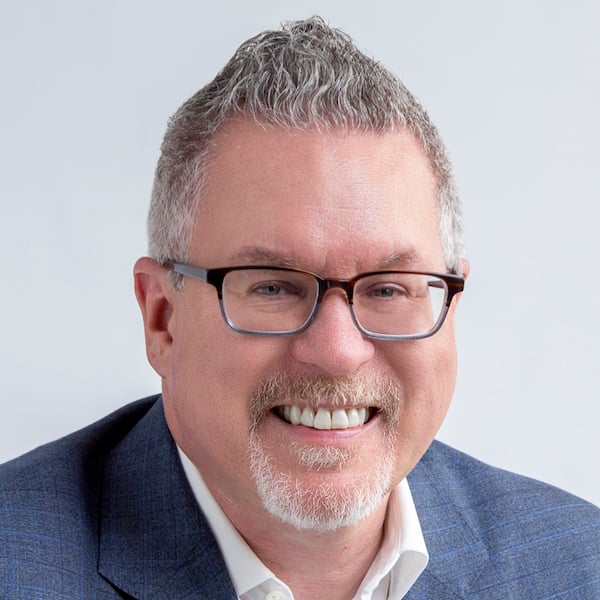
Written by Mark Graban
Mark Graban has served healthcare clients since 2005. Mark is internationally recognized as a leading author and speaker on Lean healthcare. His latest book is "The Mistakes That Make Us: Cultivating a Culture of Learning and Innovation."

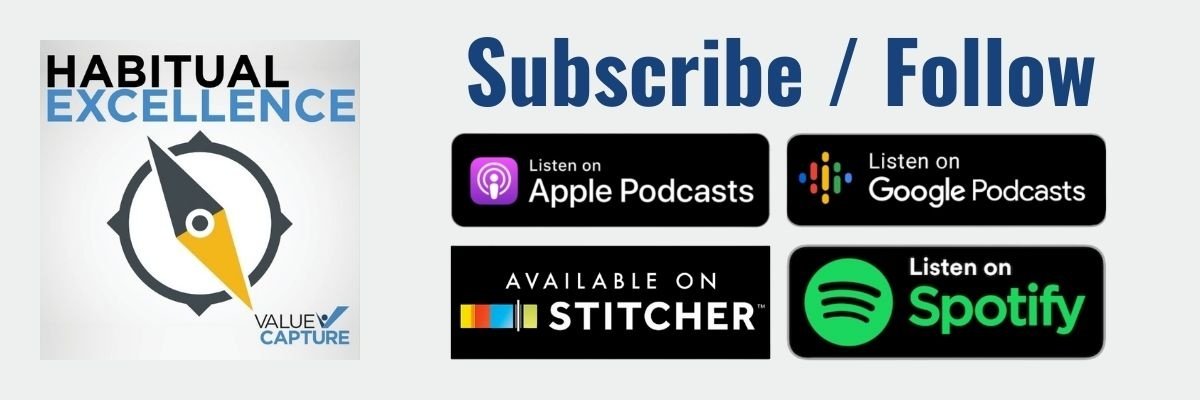
Submit a comment